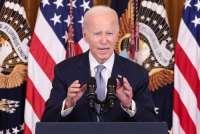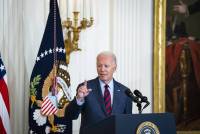Latest KFF Health News Stories
What the Health? From KFF Health News: Countdown to Shutdown
Congress appears to be careening toward a government shutdown, as a small band of House conservatives vow to block any funding for the fiscal year that begins Oct. 1 unless they win deeper cuts to health and other domestic programs. Meanwhile, former President Donald Trump continues to roil the GOP presidential primary field, this time with comments about abortion. Alice Miranda Ollstein of Politico, Rachel Cohrs of Stat, and Tami Luhby of CNN join KFF Health News chief Washington correspondent Julie Rovner to discuss these issues and more. Also, for “extra credit,” the panelists suggest health policy stories they read this week they think you should read, too.
Resurge la hepatitis C, ¿podrá el plan de Biden eliminar este viejo flagelo en cinco años?
Se calcula que el 40% de los más de 2 millones de personas con hepatitis C en Estados Unidos ni siquiera saben que la tienen, pero el virus puede estar dañando silenciosamente su hígado, causando cicatrices, insuficiencia hepática o cáncer de hígado.
Hep C’s Number Comes Up: Can Biden’s 5-Year Plan Eliminate the Longtime Scourge?
Before covid-19, hepatitis C held the distinction of claiming more American lives each year than any other infectious disease — that’s despite the marketing of several relatively affordable, highly effective treatments.
Rural Nursing Home Supporters Fear Proposed Staffing Standards Will Trigger More Closures
The Biden administration says a recently proposed minimum staffing standard would help ensure quality care, but nursing home leaders predict many rural facilities would struggle to meet it.
What the Health? From KFF Health News: Welcome Back, Congress. Now Get to Work.
Congress returns from its summer recess with a long list of tasks and only a few work days to get them done. On top of the annual spending bills needed to keep the government operating, on the list are bills to renew the global HIV/AIDS program, PEPFAR, and the community health centers program. Meanwhile, over the recess, the Biden administration released the names of the first 10 drugs selected for the Medicare price negotiation program.
No existen normas federales para proteger a los trabajadores cuando los días son excesivamente calurosos. Y sin el apoyo bipartidista del Congreso, incluso con la atención urgente de la administración Biden, es posible que el alivio no llegue en años.
Workers Pay the Price While Congress and Employers Debate Need for Heat Regulations
Studies suggest official numbers vastly underestimate heat-related injuries and illness on the job. To institute protections, the government must calculate their cost — and the cost of inaction.
Biden Administration Proposes New Standards to Boost Nursing Home Staffing
The proposal would require major hiring at the most sparsely staffed homes. But the proposal is already badly received by the nursing home industry, which claims it can’t boost wages enough to attract workers.
5 Things to Know About the New Drug Pricing Negotiations
The Biden administration unveiled the first 10 drugs subject to price negotiations, taking a swipe at the pharmaceutical industry. But what does it mean for patients?
Exclusive: CMS Study Sabotages Efforts to Bolster Nursing Home Staffing, Advocates Say
Research commissioned by the Centers for Medicare & Medicaid Services analyzed only staffing levels below what experts have previously called ideal. Patient advocates have been pushing for more staff to improve care.
What the Health? From KFF Health News: Abortion Pill’s Legal Limbo Continues
A federal appeals court issued a split decision on whether the abortion pill mifepristone should remain on the market — rejecting a lower court’s decision to effectively cancel the drug’s FDA approval in 2000, while ordering the rollback of more recent rules that made the drug easier to obtain. Nothing changes immediately, however, as the Supreme Court blocked the lower court’s ruling in the spring. It will be up to the high court to determine whether the pill remains available in the U.S. and under which conditions. Sarah Karlin-Smith of the Pink Sheet, Alice Miranda Ollstein of Politico, and Shefali Luthra of The 19th join KFF Health News’ chief Washington correspondent, Julie Rovner, to discuss these issues and more. Plus, for “extra credit,” the panelists suggest health policy stories they read this week they think you should read, too.
Feds Say Hospitals That Redistribute Medicaid Money Violate Law
Federal officials are trying to clamp down on private arrangements among some hospitals to pay themselves back for the Medicaid taxes they’ve paid. State health officials and the influential hospital industry argue that regulators have no jurisdiction over the agreements.
Proposed Rule Would Make Hospital Prices Even More Transparent
A Biden administration proposal would help standardize the data on prices that hospitals provide to patients, increase its usefulness to consumers, and boost enforcement. Previous rules gave hospitals too many loopholes.
Everything Old Is New Again? The Latest Round of Health Policy Proposals Reprises Existing Ideas
House Republican legislation promises more health insurance options but fewer protections, even as the Biden administration seeks to rein in short-term plans, which were expanded in the Trump era.
FDA Head Robert Califf Battles Misinformation — Sometimes With Fuzzy Facts
FDA Commissioner Robert Califf has called misinformation one of the deadliest killers in the United States. As the FDA tries to fight that scourge, it sometimes stumbles.
What the Health? From KFF Health News: The Long Road to Reining In Short-Term Plans
President Biden made good on a campaign promise this week with a proposal that would limit short-term health insurance plans that boast low premiums but also few benefits. Meanwhile, the Supreme Court’s decision to outlaw affirmative action programs could set back efforts to diversify the nation’s medical workforce. Alice Miranda Ollstein of Politico, Amy Goldstein of the Washington Post, and Rachel Cohrs of Stat News join KFF Health News’ chief Washington correspondent Julie Rovner to discuss these issues and more. Also this week, Rovner interviews KFF Health News’ Bram Sable-Smith, who reported the latest KFF Health News-NPR “Bill of the Month” about how a hospital couldn’t track down a patient, but a debt collector could.
CDC to Reduce Funding for States’ Child Vaccination Programs
Citing the recent debt ceiling deal, the CDC is trimming its funding to child vaccination programs that focus on communities vulnerable to disease outbreaks. The cuts come despite data showing the percentage of children getting vaccinated has dropped in recent years.
What the Health? From KFF Health News: A Year Without Roe
It’s been a year since the Supreme Court overturned Roe v. Wade and, with it, the nationwide right to abortion. The decision in Dobbs v. Jackson Women’s Health Organization set off widespread uncertainty in government and the courts about the legality or illegality of the procedure. But the decision has had other consequences too, including affecting where health professionals choose to locate. In this special episode of KFF Health News’ “What the Health?” Alice Miranda Ollstein of Politico, Shefali Luthra of The 19th, and Sandhya Raman of CQ Roll Call join KFF Health News chief Washington correspondent Julie Rovner to discuss these issues and more. Also this week, Rovner interviews KFF’s Alina Salganicoff about the organization’s research and other work on women’s health policy over the past year.
The Debt Ceiling Deal Takes a Bite Out of Health Programs. It Could Have Been Much Worse.
A bipartisan deal to raise the government’s borrowing limit dashed Republican hopes for new Medicaid work requirements and other health spending cuts. Democrats secured the compromise by making relatively modest concessions, including ordering the return of unspent covid funds and limiting other health spending.
What the Health? From KFF Health News: The Abortion Pill Goes Back to Court
A three-judge appeals court panel heard testimony this week about revoking the FDA’s 22-year-old approval of a key pill used in medication abortion and miscarriage management. The judges all have track records of siding with abortion foes. Meanwhile, as the standoff over raising the federal debt ceiling continues in Washington, a major sticking point is whether to impose work requirements on recipients of Medicaid coverage. Victoria Knight of Axios, Rachel Roubein of The Washington Post, and Sandhya Raman of CQ Roll Call join KFF Health News chief Washington correspondent Julie Rovner to discuss these issues and more.



















